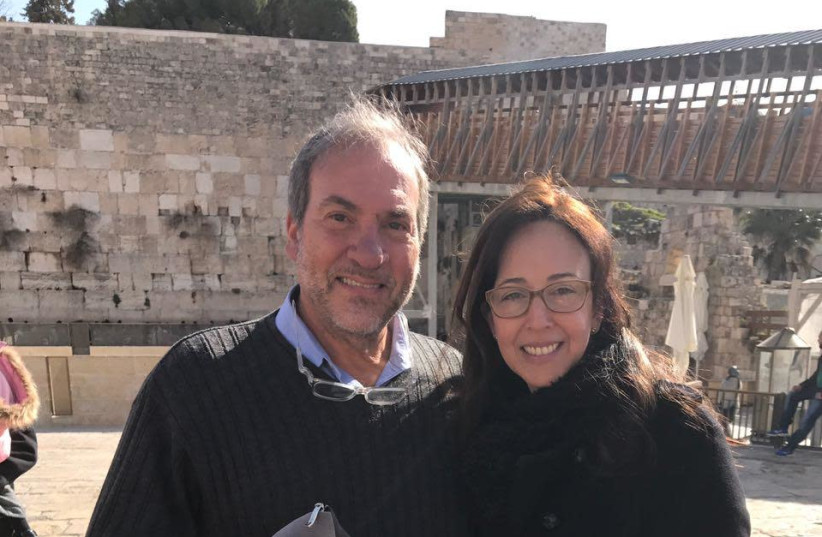I am a voracious reader. Although my ninth-grade English teacher mocked my habit of reading multiple books simultaneously, claiming I couldn’t possibly keep so many story lines straight, doing so has been a lifelong habit. It’s impossible to estimate how many books I have read in my lifetime.
I say all this to offer context for this statement: My experience of reading The Rabbi’s Widow: Turning Pain into Purpose was unlike any reading experience I have ever had. I found Joelle Eckstein’s memoir of the two years following her husband’s sudden death so intense that I could only read in short spurts, a few brief chapters at a time.
The book opens on February 6, 2019. Joelle and her husband, Rabbi Yechiel Eckstein, were just weeks away from moving to a new home in Jerusalem. Walking home from work early in order to prepare for a wedding that night and an anniversary trip that weekend, Joelle found her husband unconscious on the kitchen floor.
The paramedics were unable to revive him. When Rabbi Yechiel Eckstein was pronounced dead, Joelle writes, “My world ended.”
For close to 300 pages, in 80+ short chapters, the severity of Eckstein’s grief is laid out on the page and examined. The book is presented mostly in chronological order. In flashbacks, Eckstein describes meeting her husband, their courtship and snippets of their life together. Each chapter opens with a quote about grief or about healing, culled from sources as diverse as the Book of Psalms, Soren Kierkegaard and Oprah Winfrey.

There are some minor typos and issues with layout that don’t interfere with reading, but it’s helpful to know in advance that they exist. Eckstein said she will attend to them when she can bear to look at the text again. That’s how naked the writing is.
Eckstein takes the reader on an emotional roller coaster. A moment of healing, such as when she hears a message she is certain was intended for her embedded in one of her husband’s songs, is quickly followed by a new trial she must face. More tears and more tears. This is very raw material.
Weaving Israel's traumas with her own
Much of the story takes place in Jerusalem, and Eckstein weaves some of Israel’s traumas – the Second Intifada, the 2014 kidnapping and murder of Naftali Fraenkel, Gilad Shaer and Eyal Yifrah, the COVID lockdowns – together with her own.
A young widow at 51, she does not hide the fact that her husband’s death so paralyzed her that, for a time, the simplest tasks in life were beyond her. She gives much credit to her colleague and dear friend, Hadas Tsarfadi, who carried her through countless days when she could not carry herself.
Tsarfadi gets her own chapter in The Rabbi’s Widow to share what the time after Yechiel’s sudden death felt like for her. “I watched this strong, compassionate woman crumble. I saw a part of her die that day with Yechiel... It’s wrenching to witness the pain that keens from the soul.”
Eckstein doesn’t scrimp when describing the challenges of grieving. She writes many sentences like this: “I start to panic and tears spill over. I finally make it home and walk into the house completely broken and crying.” And like this: “I feel his painful absence. I am bereft. I cannot begin to describe the overwhelming feeling of loss. The excruciating pain.”
“I feel his painful absence. I am bereft. I cannot begin to describe the overwhelming feeling of loss. The excruciating pain.”
Joelle Eckstein
Her greatest comfort comes from an online support group for widows. She doesn’t post, but reads thousands of messages and comments. There she understands that she is not alone, that other widows experience the blinding pain of grief as she does.
The book’s subtitle Turning Pain into Purpose hints to a shift. By the end of the book, Eckstein is ready to move from the home she shared with her husband. Through her work with The Eckstein Fund (ecksteinproject.org), in which her husband’s dream of providing emergency social services to Israelis in urgent need is preserved, she finds new purpose.
And earlier this year, Eckstein launched The Rabbi’s Widow podcast, about which she writes, “Each week on my podcast, I’ll visit with other women who are also on a journey of rediscovery, as well as wonderful experts and professionals who can light the way. We’ll cover everything from getting up in the morning, to finding your purpose and creating a new role for yourself. I am The Rabbi’s Widow. My goal is to build an empowered global community of widows who help each other.”
The Rabbi’s Widow: Turning Pain into Purpose is a moving, intimate look at early widowhood, written by a woman who now lights the way for others.
The Rabbi’s Widow: Turning Pain into Purpose
By Joelle Eckstein
The Israel Center for Libraries
294 pages; $19.99
(NIS 68.50)
